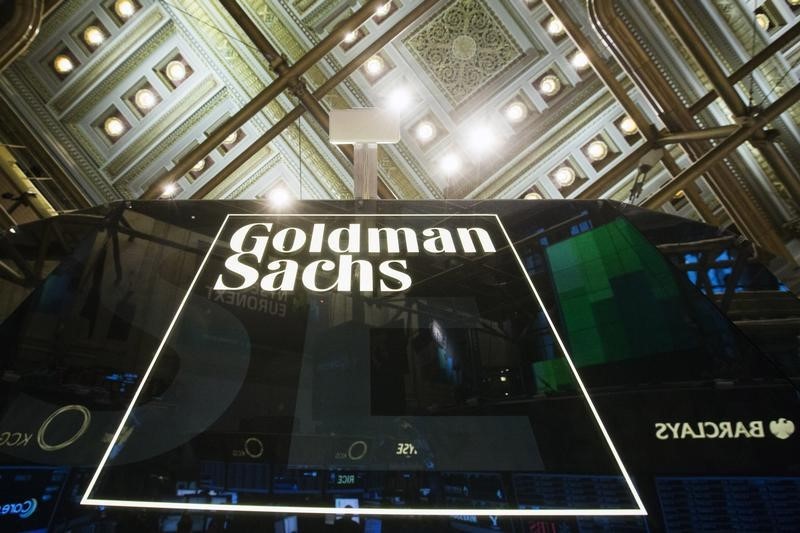By Richa Naidu and Sudarshan Varadhan
(Reuters) - Goldman Sachs Group Inc (N:GS) reported its smallest quarterly profit in more than four years as a $5 billion legal settlement from the financial crisis added pain to an already tough three months.
Like other banks, Goldman has struggled as plummeting oil prices, concerns about China's economy, and nervousness about the timing and pace of U.S. interest rate increases weighed on credit markets.
Goldman, the last of the big U.S. banks to release fourth-quarter earnings, reported a drop in revenue in all but one of its main businesses.
The one bright spot was investment banking, which helped the bank beat revenue and profit expectations.
Net earnings fell 71.8 percent in the quarter, the third straight period its profits have declined.
Goldman's shares fell as much as 2.3 percent to their lowest in more than 1-1/2 years, before easing to $152.25, down 2.9 percent on Wednesday.
Net revenue fell 5.4 percent to $7.27 billion, but topped the average analyst estimate of $7.07 billion.
Net income applicable to common shareholders dropped to $574 million, or $1.27 per share, from $2.03 billion, or $4.38 per share, a year earlier.
Excluding the settlement, which stemmed from claims the bank misled mortgage bond investors during the financial crisis, Goldman earned $4.68 per share, beating the average analyst estimate of $3.53, according to Thomson Reuters I/B/E/S.
Revenue from trading bonds, currencies and commodities (FICC) came to $1.12 billion, the lowest since the fourth quarter of 2008, during the depths of the financial crisis. The fixed income unit was dragged down by a weak commodities business.
FICC comprised 15 percent of overall revenue, a far cry from the days when it regularly contributed about 40 percent.
Bond trading by U.S. banks has been declining since 2009, mainly due to new rules that discourage them from taking unnecessary risks.
Goldman Chief Financial Officer Harvey Schwartz said products like credit and mortgages faced challenges last year, but those involving interest rates and commodities were strong.
While competitors like Morgan Stanley (N:MS) have slashed their fixed income units to account for reduced client activity over the last several quarters, Schwartz said the business could rebound.
"There certainly is a bull case in terms of fixed income activity," he said. "The stable to improving global growth we're seeing in the U.S. and across Europe could certainly be a tailwind."
Goldman's equities revenue decreased 9 percent from a year ago to $1.75 billion. The bank, which competes with Morgan Stanley in stock trading, reported lower equities revenue for full-year 2015 than its rival.
Investment banking revenue, including income from deals and underwriting of bond and share offerings, rose 7.4 percent to $1.55 billion.
Goldman ranked No. 1 in advising on both announced and completed mergers and acquisitions globally in 2015, according to Thomson Reuters data. (http://tmsnrt.rs/1UReeh4).
The bank advised on some of the year's largest deals, including the $130 billion tie-up between U.S. chemical giants DuPont (N:DD) and Dow Chemical Co (N:DOW).
However, KBW analyst Brian Kleinhanzl said while advisory revenue was strong, it was unclear if the bank could keep up the momentum, given current market turmoil.
OPERATING EXPENSES JUMP
Return on equity (ROE), a measure of how profitably Goldman uses shareholder money, was 7.4 percent for 2015, well below the 30 percent or so it achieved before the financial crisis.
Many investors argue that banks need at least a 10 percent ROE to cover their cost of capital.
Goldman's investment management arm grew its total assets to $1.25 trillion, the most ever. Revenue ticked down 1 percent to $1.29 billion from a year ago.
The division represented 21 percent of the bank's revenue for the quarter, up from 20 percent a year ago.
About half of Goldman's 2,600 new hires during the year came in investment management, Schwartz said.
Total operating expenses jumped 38 percent to $6.2 billion. Non-compensation costs soared 64 percent to $4.14 billion, due mainly to the $1.95 billion put aside for litigation and regulatory issues.
Spending on salary and benefits as a percentage of total revenue rose to 28.3 percent, versus 25.4 percent a year earlier. The bank's increased spending on employees is in contrast to the cost-cutting by its peers.

Up to Tuesday's close of $156.82, Goldman shares had fallen nearly 13 percent since the start of the year. The stock dropped 7 percent in 2015, the second worst performer among the big U.S. banks after Morgan Stanley, which dropped 18 percent.